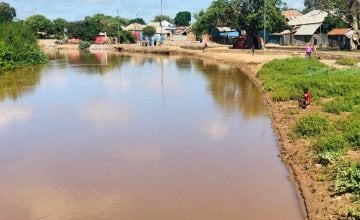
Read our 2023 annual report

Knowledge Hub
Concern responds to extensive flooding in Somalia and Kenya

Concern Worldwide teams on the ground in Somalia and Kenya are responding to widespread flooding which has affected 2.5 million people across east Africa in recent weeks, with flood waters forcing people to flee their homes, and destroying property, crops and livestock.
Heavy rainfall since early October in Kenya have resulted in flash flooding mudslides and landslides, affecting 100,000 people. The floods have damaged roads and bridges, hampering access to food, education and healthcare. The rains follow a pro-longed drought which saw 3.1 million people food insecure.
In Somalia, 334,000 people have had to leave their homes due to flooding in the south of the country, where the flow of the Juba and Shabelle rivers have increased by 200% in the past fortnight, overflowing and flooding towns and villages.
Concern is working on the ground with communities to help them protect their homes and property, and minimise the risk of water borne disease such as acute watery diarrhoea (AWD), cholera and malaria.
In Somalia, Concern staff and local partners are distributing sandbags and iron wire to reinforce river banks which are weak or damaged. AWD kits containing water treatment tablets, jerry cans, soap and mosquito nets have already been distributed to almost 10,000 people.
Emergency cash
The Somali Cash Consortium, led by Concern Worldwide, is also supporting 12,000 people with emergency cash assistance to help them rebuild and recover from the floods.
Communities are being assisted to relocate irrigation equipment, livestock and other livelihood assets to higher ground.
Concern and its partners are working with Community Resilience Committees to share weather forecasting information and flood alerts. Working with local hospitals and through its own network of clinics, Concern is undertaking disease surveillance in flooded communities.
In Kenya, Concern is working with flood affected households in Marsabit in the north west of the country. It is providing cash transfers funded by the EU (ECHO) to help those most affected by floods. This payment is in addition to a separate monthly payment households have been receiving from Concern to help them cope with the impact of the drought.
“The current floods are the worst we have seen in recent years in the Horn of Africa region, and are hitting many communities which have just survived a severe drought, with the loss of livestock and a poor harvest,” Concern’s regional director for the Horn of Africa Carol Morgan said. “It is vital that these communities receive the necessary supports to limit the impact of the flooding and then rebuild once the floodwaters subside.”
The unusually heavy rains have primarily been driven by a weather phenomenon known as the Indian Ocean Dipole, according to the Intergovernmental Authority on Development (IGAD) Climate Centre. This occurs when the western Indian Ocean is warmer than the eastern Indian Ocean. In October the difference was two degrees – the greatest difference since 2006. This temperature difference, causes greater evaporation off the east African coastline, resulting in heavier rains inland and droughts in Australia.
Higher than usual rainfall is expected to continue in the region throughout November and December, with persistent risk of floods, according to the IGAD.
For media queries contact Eamon Timmins, Media Relations Manager, 01 4177712, 087 9880524 or by emailing eamon.timmins@concern.net
Our impact in 2023
people reached through our emergency response
people reached through our health interventions
people reached through our livelihoods programmes
Other ways to help
Corporate support
Is your company interested in working together for a common cause?
Fundraise for Concern
From mountain trekking to marathon running, cake sales to table quizzes, there are lots of ways you can support our work.
Buy a gift
With an extensive range of alternative gifts, we have something to suit everybody.
Leave a gift in your will
Leave the world a better place with a life-changing legacy.
Volunteer with Concern
The lots of ways to get involved with our work as a volunteer
School fundraising
Without the generous support from schools, we wouldn't be able to do the work that we do.




